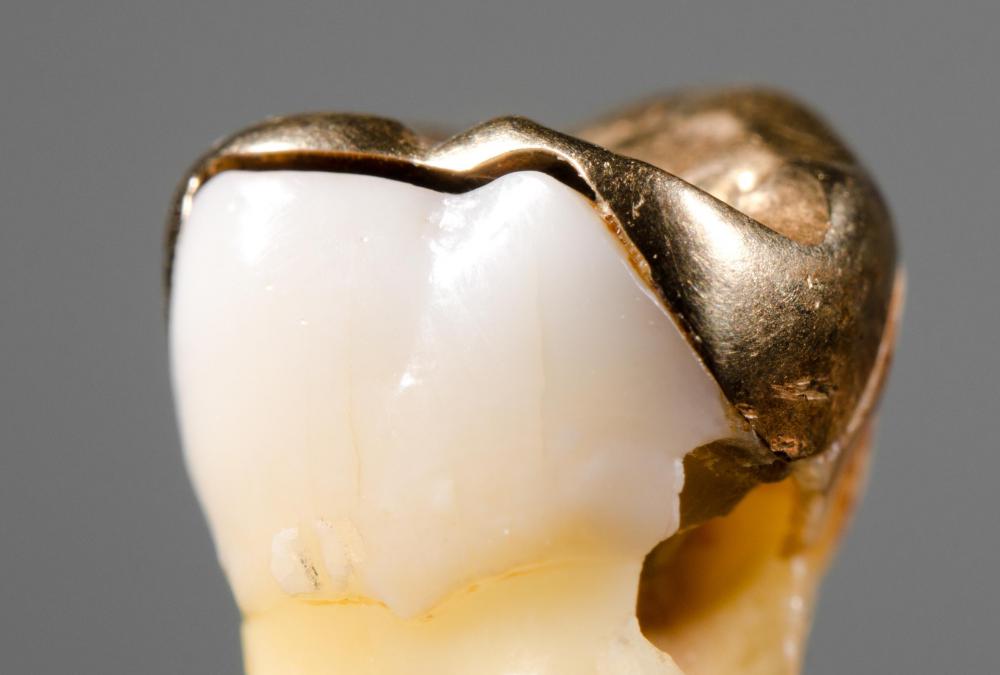At WiseGEEK, we're committed to delivering accurate, trustworthy information. Our expert-authored content is rigorously fact-checked and sourced from credible authorities. Discover how we uphold the highest standards in providing you with reliable knowledge.
What are the Most Common Causes of Tooth Nerve Pain?
Tooth nerve pain — also known as a toothache — is a dental issue that often occurs when the root of a tooth is exposed or comes in contact with something that triggers pain. This usually is a result of decay disease, or injury to the tooth. More specifically, some of the most common reasons that people suffer from tooth nerve pain are from cavities, periodontal disease or damaged teeth.
Dental cavities are a common cause of toothaches. Cavities, quite literally, are holes that have formed in the teeth because of plaque buildup. Plaque forms on the teeth after they are exposed to the sugar and acids that are found in foods and drinks. If the teeth aren’t properly cleaned, the plaque turns to tartar, and the wear from sugar and acid eventually erodes the enamel of the tooth. Generally, pain occurs after the cavity has reached the nerve endings deep inside the tooth.

Another common source of toothaches is periodontal disease, which is also known as gum disease or, in its milder form, gingivitis. Periodontal disease occurs when bacteria in the mouth collect along the gum line over an extended period of time without proper cleaning. The gums eventually begin to deteriorate and become red, swollen and inflamed. Additionally, bleeding might occur with flossing or brushing, a telltale sign of gum disease. Another telling mark of periodontal disease is receding gums, which, in addition to giving the appearance of elongated teeth, leave the roots of the teeth exposed to sensitivity and tooth nerve pain.

Teeth that are damaged from grinding or that have been chipped or damaged are another typical cause of toothaches. Teeth-grinding — or bruxism — is a habit that some people form that usually worsens during sleep, when the grinding and clenching of the jaw cannot be controlled. Over time, bruxism can lead not only to sore jaws but also to teeth that are flattened and chipped from the intense force of the grinding. This results in sensitivity of the tooth nerves, because the enamel of the tooth is eventually damaged and worn down.

Tooth nerve pain can be tolerable, but as time progresses and the afflicted tooth goes without treatment, discomfort can become severe. The range of pain usually depends on the severity of the problem and the contact that the exposed tooth nerve encounters. For example, a typical complaint that toothache-sufferers have is the intense pain that comes from contact with foods and beverages that are too hot or too cold. Another example of nerve pain is a dull ache that intensifies with chewing or when pressure is put on the teeth.

A common fix for toothaches is the use of topical oral treatments that temporarily numb the painful area when applied. Taking acetaminophen or ibuprofen can also provide temporary relief from pain. A thorough dental examination from a dentist or oral health specialist will successfully determine the exact cause of tooth nerve pain, which might be because of any of these common examples. A dental professional will also be able to determine an appropriate and effective treatment for the pain.
AS FEATURED ON:
AS FEATURED ON:














Discussion Comments
@rundocuri- I have had tooth grinding problems too, and for me the only thing that helped was to wear a nighttime tooth guard. This type of dental device fits comfortably over your top or bottom teeth or both, and can even be custom made for a precise fit.
When wearing a mouth guard during the night, you won't be able to put pressure on your teeth if you do clinch your jaws while you sleep. This will prevent tooth nerve pain from developing.
While you can buy mouth guards at any pharmacy or retail store, your can also choose to have one professionally made so that it fits exactly to the shape of your teeth. If you decide that a custom-made mouth guard is probably going to be best for your issues, you should talk to your dentist about having one made for you.
I occasionally have tooth nerve pain from grinding my teeth at night. Since I don't even know that I am doing it, how can I control this problem so my teeth stop hurting?
A few years ago I damaged a tooth when I bit down on a hard piece of candy. It set off tooth nerve pain that would not go away, even after I had my cracked tooth fixed. I dealt with this issue with over-the-counter pain medication, and over time, it subsided.
The bottom line is that sometimes tooth nerve pain is persistent, so when this occurs you have to be persistent when treating it.
Post your comments